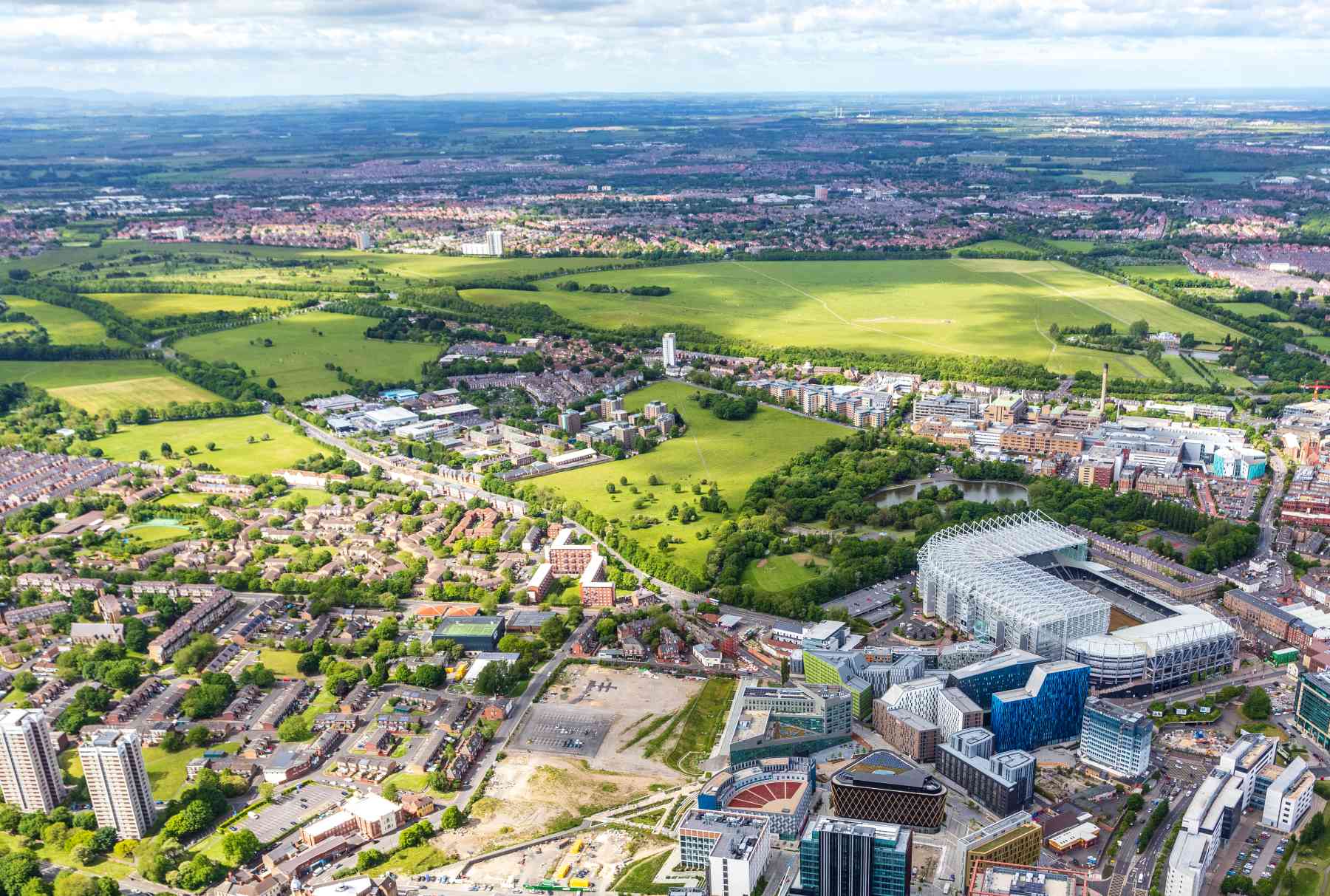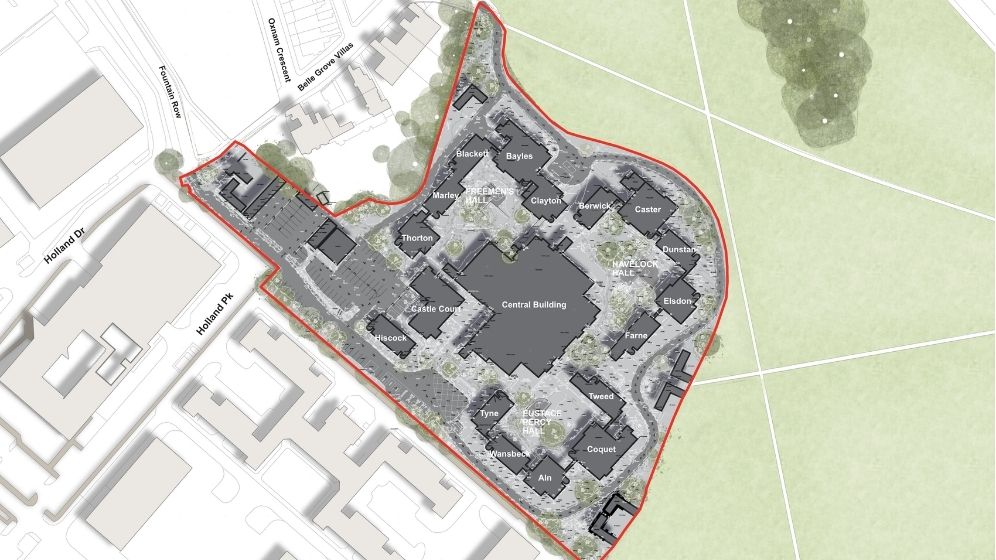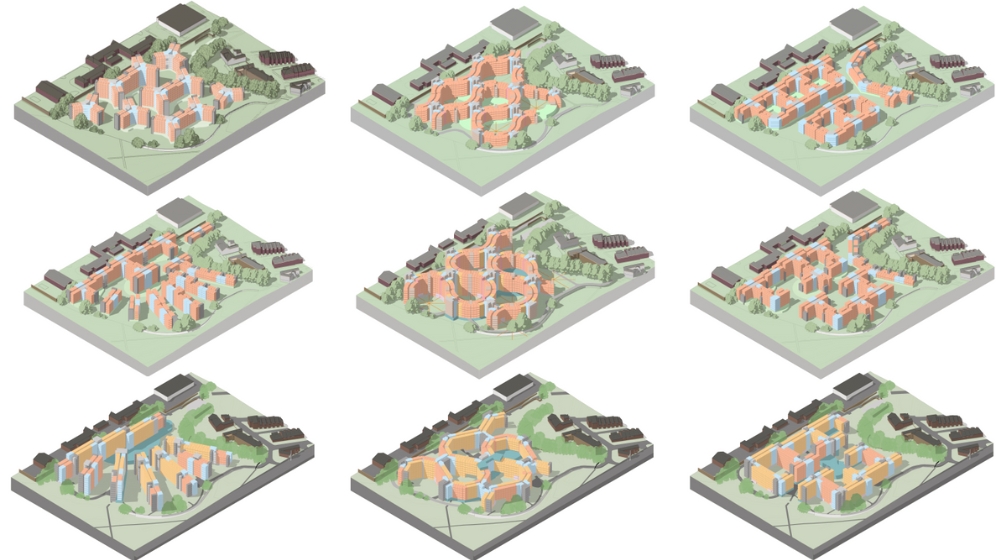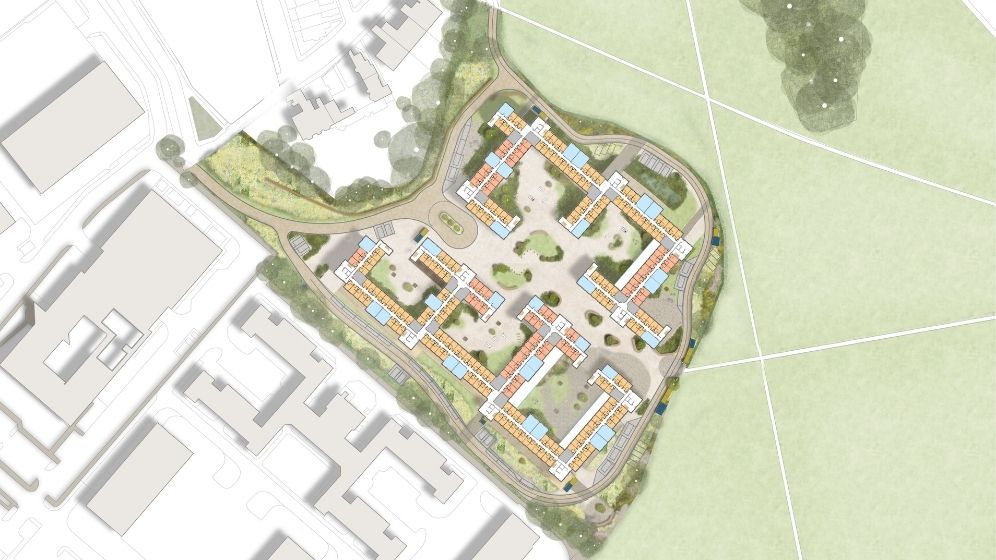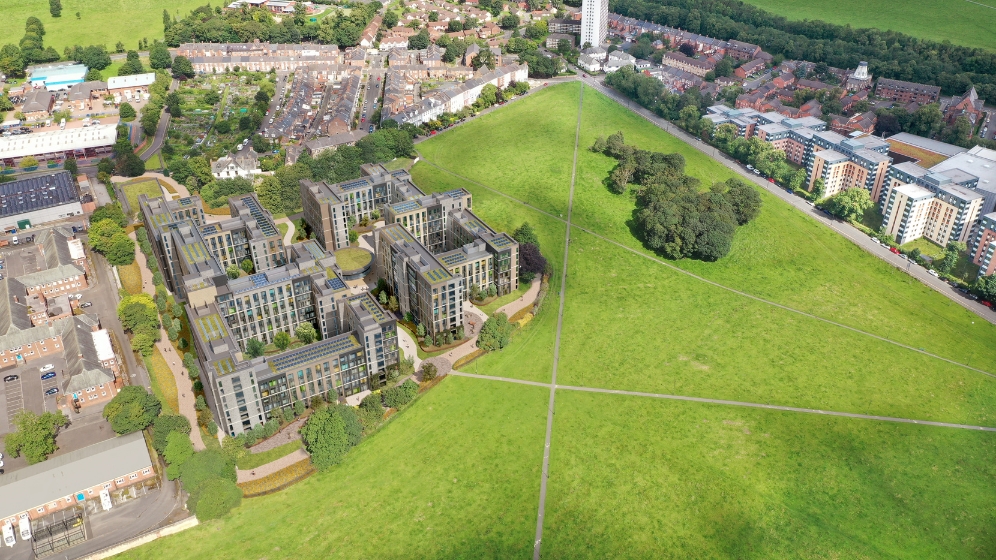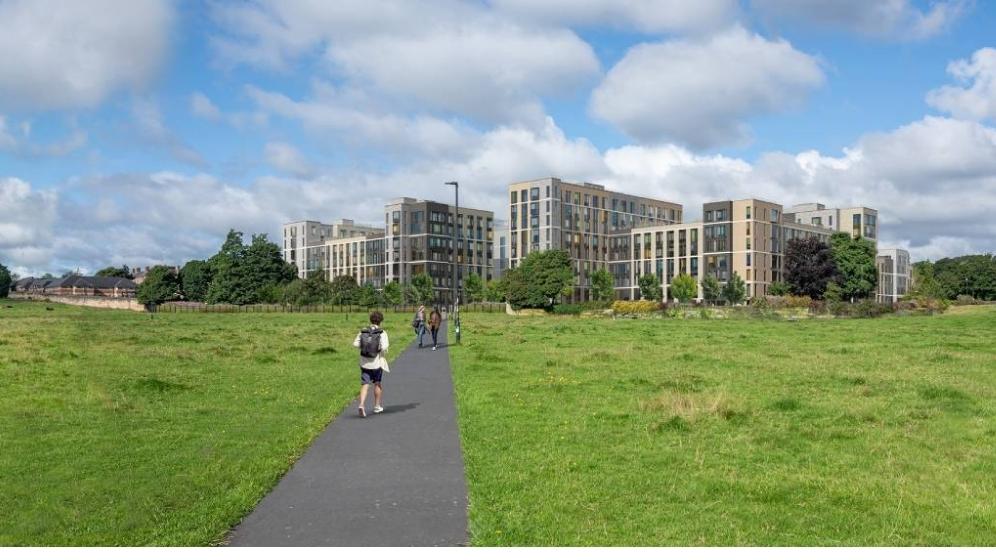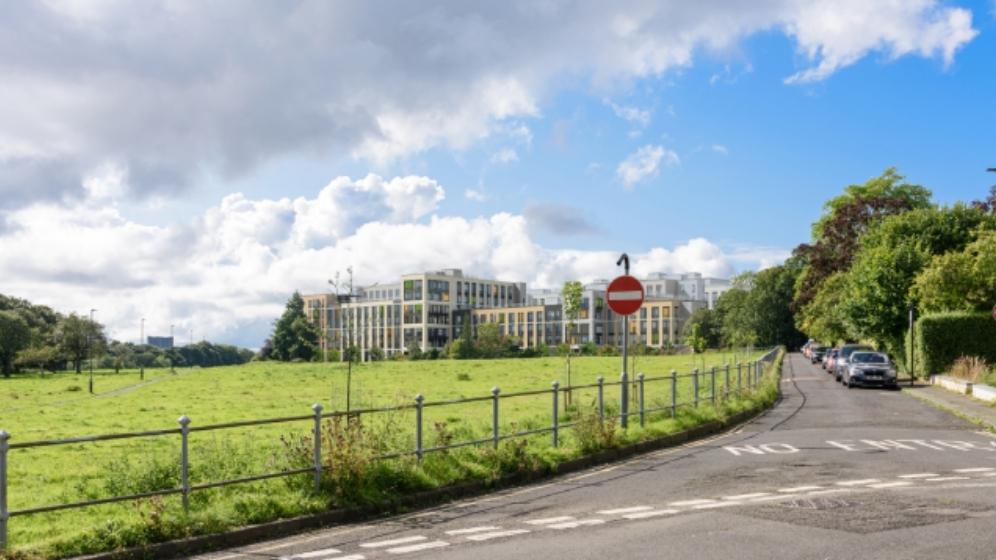Castle Leazes Redevelopment
Castle Leazes halls of residence opened in the mid-1960s. It is our second largest student accommodation site with more than 1000 bedrooms.
The buildings and their surroundings are approaching the end of their designed life so we are beginning a redevelopment project that will:
- meet the needs of our future students
- consider nearby residents and businesses
- improve the appearance of buildings and their surroundings
- deliver the highest levels of sustainability
- meet the requirements of a world class University
The case for redevelopment
Students bring a wide range of economic and social benefits to the city and region. A modern accommodation offer is key to continuing to attract students to Newcastle upon Tyne.
View the planning application
Use the Newcastle City Council portal to view and feedback on the proposed redevelopment.
How the design is taking shape
A phased approach to planning permission
We're using a phased approach to the planning application process. This means we will use two different planning applications.
An approach to planning called Prior Approval has been used to to seek permission for the demolition works. Newcastle City Council have now issued the approval notice for the demolition works.
A second application has now been prepared and submitted for the redevelopment of the site. You can view this application online.
A third planning application may also be submitted to change road access to the site from Fountains Row to Holland Drive. This is dependent on agreement with key stakeholders and discussion is underway.
Contractor updates
Bowmer and Kirkland is a British construction company. They are leading the building work for the redeveloped Castle Leazes site.
Previous projects they have completed for Newcastle University include:
- Urban Sciences Building
- The Catalyst
- The Stephenson Building
We started on site earlier this week with tree protection fencing, which will be followed next week by the erection of the permanent hoarding to fully secure the site for the duration of the demolition period.
We will soon also begin the soft strip of any remaining items within the old buildings and complete any required surveys.
The removal of invasive plant species will also be undertaken under carefully managed conditions.
Demolition works will start at the end of June, removing the existing energy centre, garages and two bungalows at the site entrance. We will be providing clear directional signage of safe routes around the site during these works.
We will keep you up to date with regular newsletters to provide an update on progress and forth coming activities. We thank you in advance for your patience while we are on site and we aim to keep disruption to a minimum.
Social value
We are liaising with numerous local charities to donate items such as surplus furniture from the current buildings.
Bird and bat boxes will be installed from the start to assist with protecting wildlife. The hoarding will have gaps cut into it to maintain the hedgehog ‘highway’ routes.
The vacant buildings are currently being used as a training facility for Tyne and Wear Fire and Rescue Service to give their staff invaluable experience of buildings of this nature.
A weekly schedule of on site works will be posted on the site notice board. All works will be undertaken in accordance with the Demolition Environmental Management plan that has been agreed with Newcastle City Council. This includes the establishment of a community liaison group which will be set up alongside the Local Ward Councillors.
If you have any questions or comments please use one of the following:
- send us a message or text (including the site ID number 38251) to 07400 334 880 (does not accept calls)
- contact one the project team
- Joe Baron (project manager)
- j.baron@bandk.co.uk
- 01915 203 333
- Laura Brown (social value manager)
- laura.brown@bandk.co.uk
- 07867 162 316
- Joe Baron (project manager)
Feedback we have received and our responses
We received many responses in the first consultation rounds for the proposal. These responses have been collated and analysed with several key topics identified. We set out below our response to these key topics.
General Matters
The current Halls of Residence is approaching its end of life. There is a need to replace these to ensure a continued accommodation supply. This is important to the Newcastle University offer and the wider City. In addition, a growth in student population has not been matched with the expansion of university-owned accommodation or met fully in the wider market.
As a result of this, the University has needed to secure nomination agreements with third party owners of Purpose-Built Student Accommodation (PBSAs) to meet this gap between supply and demand. A shortage of accommodation causes rent increases which can then make Higher Education too expensive for some students. This means that they may choose to live in Houses in Multi Occupation (HMOs) which tend to be cheaper. This is contrary to Newcastle City Council’s policy to reduce HMOs across the City.
The design team is working on a scheme to establish the size of buildings - looking at scale and massing - appropriate to the site.
This is continuing to evolve and views are sought as part of this consultation.
The scale and massing of the proposed scheme will influence the final unit numbers. As such a definitive position on numbers is not available.
An increase in capacity from the current bed units of 1,250 is being sought.
The potential impact of increased numbers is being considered in relation to activity outside the site itself as part of the design process and will inform any management/ mitigation measures necessary to minimise any impacts
The price of the student accommodation will be driven by the market.
This has been raised with the University for their consideration.
The current shortfall of student accommodation does cause pricing challenges which the new Halls of Residence will assist in addressing.
Land registry searches have been undertaken to confirm the ownership of land in and around the site itself.
The design team's Heritage Consultant, in liaison with Newcastle City Council's Conservation Officer, has also confirmed the heritage assets which are being taken into account in the design evolution.
The University is keen to support integration between students and local communities.
We would welcome thoughts on what this looks like from the community’s perspective.
For example, is there a question about what more students could do to help the local community? Or a suggestion of community amenities to be based on the site?
The University is committed to working with residents to inform the redevelopment through open days and workshops as set out in the Consultation Plan which is available on request.
This website also provides a continued opportunity to view and comment on plans as they emerge.
Next consultation event
The next event for local residents and business to discuss the planning application approach will be held:
- Wednesday 28 February 2024
- 1500hrs
Representatives of Newcastle University, our consultants Unite Students, and the design team are attending the meeting to listen to your thoughts and answer your questions.
Sustainability and Design
The emerging proposals for the redevelopment are shown on this web page. Design options are also displayed.
Detail of the elevation treatment is being considered with the CGI’s presented here being illustrative.
Once the form of the scheme has been fixed, detailed design work can progress in earnest.
That detail will be presented at the next consultation event.
The scheme offers the opportunity to address the poor quality of boundaries where they are in the control of the University. Comments received so far are supportive of addressing the main external boundary wall.
Options are being considered to provide well designed and robust boundary treatments to address current issues around recurring vandalism.
We would welcome your thoughts and views on what you would like to see happen.
The location and operation of bin stores is being considered as part of the emerging design options.
This will take into account residents’ concerns about the visual impact of such stores.
Location, design and landscaping will minimise any visual impacts of stores within the scheme.
Projections do not suggest demand reducing. They suggest demand will increase. This supports the significant investment commitment by the University to redevelop the accommodation.
Future proofing is a consideration for the design team to reflect the lifespan of the new scheme and potential changes in requirements.
This includes scope for movable walls and multi-function spaces within the building design.
There have been concerns expressed about the withdrawal of the catering offer on the site and need for some retail offer with campus.
The internal layout will be of a high standard and will include areas of private indoor and outdoor space for students.
The exact nature of the on-site offer is still under review as the scheme design evolves.
Residents’ concerns regarding the withdrawal of the catered offer, and a preference for some onsite provision of retail is noted.
The significant capital expenditure that would be required for remodelling and updating the buildings would still not achieve fit for purpose accommodation.
The University is committed to developing a sustainable campus with an aim to achieve net-zero emissions by 2030.
This also aligns with Newcastle City Council’s own net zero target. In relation to Castle Leazes, a specialist sustainability consultant, JH Partners, are advising on all aspects of sustainability.
A range of energy options will be built into the scheme including photo-voltaic panels (aka solar panels), air source heat pumps, and a fabric first approach to energy efficiency.
Communication between the sustainability consultant and the City Council’s sustainability officer are ongoing to ensure that the most deliverable sustainability solutions are included in the scheme.
A consultant has been instructed to examine daylight/sunlight. Their assessment will form part of the planning application submission.
Highways and connectivity
You said:
- Consideration should be given to the site access and footpath connections
- Local road and pedestrian connection improvements are needed
- Can Holland Drive provide alternative access?
- How will parking, cycle/scooter storage, taxis and deliveries be addressed?
- Concerns about noise, disturbance and anti-social behaviour
SAJ, the appointed transport consultant, the University and the wider design team are exploring how the scheme will incorporate access and how on-site operations could work to minimise impacts outside the site.
Dialogue is ongoing with Newcastle City Council in relation to the wider road network and the day-to-day operation of the site.
Discussions are ongoing in relation to the site access and footpath connections.
We continue to explore the potential to change road access to Castle Leazes from Fountains Row to Holland Drive. If it is determined that Holland Drive can become an alternative access route an additional planning application will be made. This would outline the proposed changes including any proposed adjustment to Fountains Row.
On-site drop off points, cycle/scooter parking and storage, and delivery drop off points within the site are being incorporated throughout the scheme layout.
Ecology and Landscape
Discussions are ongoing in relation to landscape and ecology to ensure that the approach taken is suitable and sensitive to existing habitats and species and delivers Biodiversity Net Gain.
This includes consideration of hedgehog routes raised by residents.
A full arboricultural survey has been undertaken.
The brief for the design team is to retain as many trees as possible.
The retention of the important perimeter trees is a key driver of approach to the scheme design. It is unfortunately inevitable that trees within the centre of the site will be lost during demolition.
New tree planting within the site will be integrated into the overall landscaping for the scheme, as well as additional tree planting off-site as part of an overall Biodiversity Net Gain approach.
The precise location for offsite biodiversity enhancement has not been confirmed but discussions are ongoing.
Impact on amenity
Concerns have been raised regarding harsh lighting at the Park View accommodation. Lighting being on continuously is also a concern. Lighting that uses sensors to come on when needed has been suggested in feedback.
As an existing developed site it is not considered that the final proposal will result in any substantive lighting change to the site and locality.
The lighting design will consider wider impacts with the concerns regarding Park View taken into account for a final lighting proposal.
The University has instructed Apex Acoustics to advise on noise matters.
A Noise Assessment in relation to the redevelopment proposals will be prepared and submitted with the planning application.
The scope of that assessment is being agreed with the Environmental Health Officer at Newcastle City Council.
So far, consultation responses relating to impact on local facilities were two-fold:
- There was concern expressed about the loss of trade over the demolition and build period which will be detrimental to businesses but also positive comments relating to the continued support to local business from the students.
- There were also negatives with regard to student disturbance when going to and from local businesses.
The University works closely with students in relation to their behaviour in the wider community and will continue to explore management of that once the new Halls of Residence is opened.
Demolition of the existing building will be through a managed deconstruction to enable recycling of the materials and also a managed operation of the site to minimise local impact.
A Construction Environment Management Plan will be produced which will set out in detail how both the demolition and also construction works will be undertaken which will include details regarding dust and noise management, traffic management, hours of working etc.
Concerns over anti-social behaviour, noise, security and disturbance are taken seriously by the University and design solutions to assist in managing these issues are at the forefront of the design team’s brief.
The on-site design considerations include the creation of spaces to provide students with well-designed and meaningful spaces that will encourage them to stay within the site.
In addition to other design elements, this will directly assist in addressing concerns raised regarding students using the adjacent Moor excessively.
